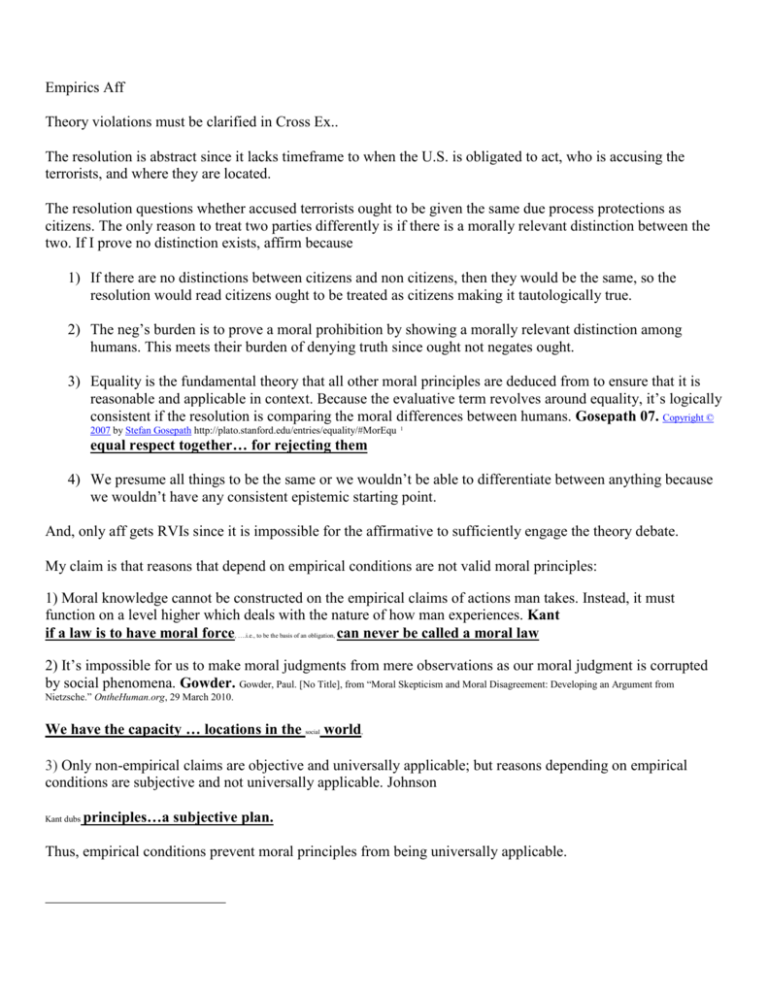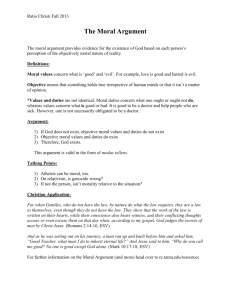
Empirics Aff
Theory violations must be clarified in Cross Ex..
The resolution is abstract since it lacks timeframe to when the U.S. is obligated to act, who is accusing the
terrorists, and where they are located.
The resolution questions whether accused terrorists ought to be given the same due process protections as
citizens. The only reason to treat two parties differently is if there is a morally relevant distinction between the
two. If I prove no distinction exists, affirm because
1) If there are no distinctions between citizens and non citizens, then they would be the same, so the
resolution would read citizens ought to be treated as citizens making it tautologically true.
2) The neg’s burden is to prove a moral prohibition by showing a morally relevant distinction among
humans. This meets their burden of denying truth since ought not negates ought.
3) Equality is the fundamental theory that all other moral principles are deduced from to ensure that it is
reasonable and applicable in context. Because the evaluative term revolves around equality, it’s logically
consistent if the resolution is comparing the moral differences between humans. Gosepath 07. Copyright ©
2007 by Stefan Gosepath http://plato.stanford.edu/entries/equality/#MorEqu
1
equal respect together… for rejecting them
4) We presume all things to be the same or we wouldn’t be able to differentiate between anything because
we wouldn’t have any consistent epistemic starting point.
And, only aff gets RVIs since it is impossible for the affirmative to sufficiently engage the theory debate.
My claim is that reasons that depend on empirical conditions are not valid moral principles:
1) Moral knowledge cannot be constructed on the empirical claims of actions man takes. Instead, it must
function on a level higher which deals with the nature of how man experiences. Kant
if a law is to have moral force, ….i.e., to be the basis of an obligation, can never be called a moral law
2) It’s impossible for us to make moral judgments from mere observations as our moral judgment is corrupted
by social phenomena. Gowder. Gowder, Paul. [No Title], from “Moral Skepticism and Moral Disagreement: Developing an Argument from
Nietzsche.” OntheHuman.org, 29 March 2010.
We have the capacity … locations in the social world,
3) Only non-empirical claims are objective and universally applicable; but reasons depending on empirical
conditions are subjective and not universally applicable. Johnson
Kant dubs
principles…a subjective plan.
Thus, empirical conditions prevent moral principles from being universally applicable.
And, if moral principles are based on empirical conditions there’d be no reason to expect everyone to know
them or be able to know them because knowing empirical conditions depends on you being in the right time and
place to experience it
I contend that the only way to prove a difference among humans is through an empirical condition.
First, all the neg arguments are derived from empirical differences.
Second, the only distinction between citizens and non-citizens is their country of origin or the country that the
person identifies with.
Third, the only difference among humans is our genetic make up which is purely empirical. Connor 06. Steve
Connor. The Independent. Genetic breakthrough that reveals the differences between humans
SCIENCE EDITOR THURSDAY 23 NOVEMBER 2006 http://www.independent.co.uk/news/science/genetic-breakthrough-that-reveals-the-differences-betweenhumans-425432.html
it was assumed that …prone to serious diseases.
Fourth, American Heritage ( The American Heritage® Dictionary of the English Language, Fourth Edition copyright ©2000 by Houghton Mifflin
Company. Updated in 2009. Published byHoughton Mifflin Company. All rights reserved.)
2
defines humans are defined as “of, relating to, or characteristic of humans.” The only way to identify a human
is through representations of its form. However, defining the essence of humanity through empiricism fails.
Nietzsche: Friedrich Nietzsche, On Truth and Lie in an Extra-Moral Sense, in The Portable Nietzsche, ed. Walter Kaufmann, 1954,
pg. 46-47
Every concept originates …these individual differences.
Fifth, all humans are biologically constructed in the same way, just with superficial distinctions like race, sexual
organs, and possibly nationality.








